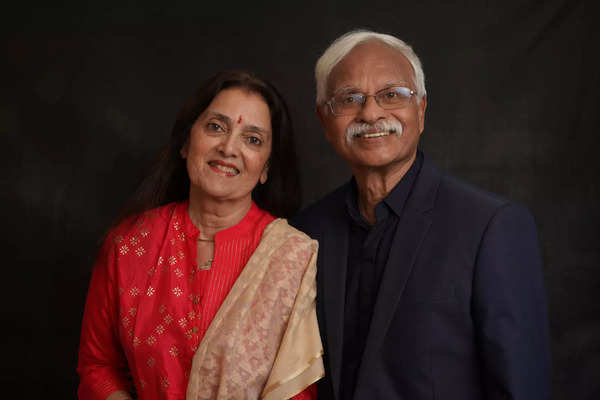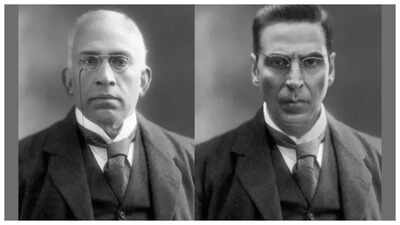Kesari 2: Forgotten Legacy to Big Screen Revelation

“History had completely forgotten this man. Dharma has brought him to the world.” — Pushpa Palat
There are stories tucked deep within the folds of history—buried under decades of indifference—that, when uncovered, challenge the narratives we’ve long accepted. One such tale is now finding its way from dusty archives to silver screens, thanks to authors Raghu and Pushpa Palat. Their historical book, The Case That Shook the Empire, charts the remarkable legal battle that followed the Jallianwala Bagh massacre and spotlights a forgotten hero: Raghu’s great-grandfather Sir Chettur Sankaran Nair, a man whose fight for justice shook the very foundations of British rule in India. He served as Advocate-General of Madras (1906–1908), puisne justice at the Madras High Court (1908–1915), and Education Minister on the Viceroy’s Executive Council (1915–1919). Earlier, he was elected president of the Indian National Congress in 1897, marking a significant role in India’s legal and political landscape.

A Legacy Unearthed in Amritsar
“He is my great-grandfather. I knew of him, but I did not really realize the extent of his contribution and the work that he had done.” — Raghu Palat
The journey of rediscovery began, not with academic research, but a family holiday. On a visit to the Golden Temple in Amritsar, Raghu and Pushpa Palat decided to explore Jallianwala Bagh—the site of the horrific 1919 massacre that claimed hundreds of lives. Like many visitors, they expected a sobering history lesson. What they got instead was a life-altering revelation.
“I knew nothing about Jallianwala Bagh except that a massacre had taken place. But I didn’t know the details,” Raghu admits.
While exploring the museum on site, Pushpa made a stunning discovery.
“She came running up to me and said, ‘There’s a plaque in honour of your great-grandfather,’” recalls Raghu. And neither of them the story behind the plaque and that moment became the catalyst for a deeper exploration into a legacy almost erased by time and Raghu Palat decided to write a small article about it after his research.
What began as a short article for his daughters, Divya and Nikhila, quickly grew into a larger vision. Pushpa, moved by the gravity of the content, urged Raghu to turn it into a book. “You should write a book,” she insisted. And so began their collaborative plunge into history.
Turning Pages, Rewriting Memory
“We had never written a historical novel, firstly. Secondly, we had never collaborated before.” — Pushpa Palat
The couple immersed themselves in the chilling aftermath of the massacre—British martial law, public floggings, crawling orders, and the dehumanization of an entire community. Central to their narrative was the landmark defamation trial against the British government—a trial spearheaded by Raghu’s great-grandfather, which dared to expose the Empire’s cruelty.
“This Jallianwala Bagh is known because of this case,” Pushpa explains. “He had written that it was the governor who was responsible because he was the final authority.”
The emotional impact of their work rippled across readers, especially in Punjab. Pushpa recounts the response from locals: “There were people in Amritsar who called and said they couldn’t read it. They had to stop reading because they were crying. They didn’t know that their families had gone through this.”
From Manuscript to Movie Magic
When their daughter Divya Palat and son-in-law Aditya Hitkari pitched the story to Dharma Productions, it found a cinematic future that neither Raghu nor Pushpa had anticipated.
“They felt that would be the best vehicle. They have been exceedingly good with us,” said Pushpa, grateful for the production house’s faith in their narrative.
The result is Kesari Chapter 2, starring Akshay Kumar, Ananya Panday, and R. Madhavan. While the screenplay doesn’t replicate the book word-for-word, it retains its emotional and political core.
“They told us from the beginning—it has to be an adaptation, because it’s cinema… But the adaptation has been powerful,” Pushpa shares.
She reserves special praise for Akshay Kumar’s portrayal of her husband’s great-grandfather: “He has done a great performance. There are highs and lows in his life—and all that you can see on his face… He’s pitted against Madhavan. It’s two giants kind of pitted against each other.”
The Trial That Shook an Empire
The heart of both book and film lies in the trial that followed the massacre—a case that turned the spotlight on the very idea of British justice in India.
“When the trial happened… the so-called British justice system… As Mahatma Gandhi said, the case put the British government and the British people on trial. They were found wanting,” says Raghu.
It was this trial that marked a turning point in the freedom movement. Until then, the Indian political class had been demanding dominion status. But after the revelations of the trial, the tide shifted.
“That’s when everybody knew,” Raghu continues. “Earlier they were all talking about dominion status. Now it’s full freedom. Indians governing themselves.”
A Hero Remembered, A Nation Reminded
The journey of The Case That Shook the Empire is more than a publishing success. It’s a cultural reckoning. A buried legacy has been brought to light. A forgotten man has finally found his place in history.
“His great-grandfather’s character has come out so beautifully,” says Pushpa. “Where history had completely forgotten this man, Dharma has brought him to the world.”
As Kesari Chapter 2 hits global screens, it does more than entertain—it resurrects a chapter of Indian resistance, reminds us of the cost of justice, and introduces audiences to a man who, long ago, dared to shake an empire.





